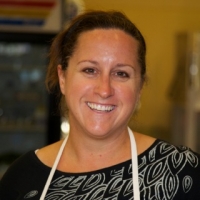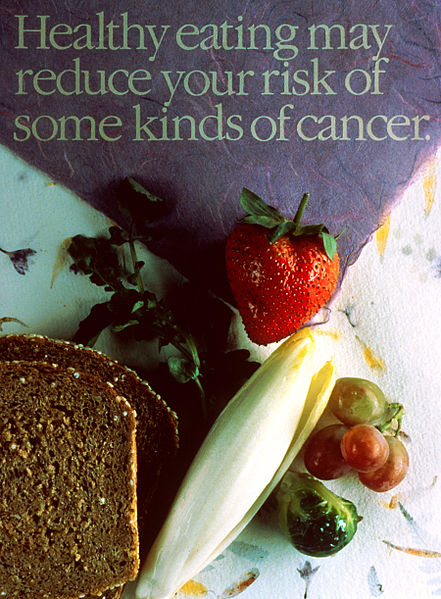Today SevenPonds speaks with Angela Farley, the founder and executive director of Teen Kitchen Project based in California (read part one here.) The organization provides nutritional whole foods to families experiencing a serious illness. Teenagers who volunteer get hands-on training in the kitchen providing meals for families. The goal of the project is to give patients and caretakers a healthy option that takes the burden out of cooking at home. After Angela Farley’s son was diagnosed with a rare lung cancer, she decided to help others going through cancer treatments. Through Teen Kitchen Project, she has provided more than 11,000 meals for families.
 Marissa: Describe your day-to-day schedule at Teen Kitchen Project. What exactly do you do every week?
Marissa: Describe your day-to-day schedule at Teen Kitchen Project. What exactly do you do every week?
Angela: Well, on Saturday our chef goes to the farmers market and orders produce. Sometimes our chef gets food that’s only seasonally available. We create menus for the week based on ingredients. Every delivery consists of three main meals, one side, a salad or soup and one dessert. On Wednesdays, we deliver the dishes for the week.
Marissa: Is your delivery system only for private homes, or have you also expanded to other larger facilities?
Angela: We only deliver to private homes. We don’t deliver to hospitals or nursing facilities. Honestly, we would probably have to scale up quite a bit for us to be able to pull that off. Right now, we’re just focused on serving people at home. It would also be a little strange to come into a nursing home and serve only one person in a room, but not the whole facility (laughs). You know, maybe there’s someone down the hallway who doesn’t qualify for the program. It would be a difficult situation.
Marissa: I can imagine. How do you qualify for meals at your organization?
Angela: We mainly serve people who are in crisis due to a life-threatening illness. We get a lot of referrals from cancer treatment centers and hospice care. We also get people via social workers.
Our teens don’t have to know anything about cooking or working in a kitchen to join. We teach them everything they need to know. – Angela Farley
Marissa: What about the people who work for you? How do teens qualify for the volunteer program?
Angela: Our teens don’t have to know anything about cooking or working in a kitchen to join. We teach them everything they need to know. Adults who volunteer for us we prefer to have more experience.
Marissa: Do you have any personal stories that stuck with you about working with one family in particular?
Angela: Oh yes, I have a lot of families like that. One that comes to mind is a young, single mom. She has stage four breast cancer. They live in a trailer in these remote hills, and there’s not really a whole lot around them. She has young children. She was always too tired or sick to go out. It turns out that her children really like the food we bring them. I’m so glad that I could help.
Marissa: Do you build personal relationships with the people you deliver food to often, or is this rare?
Angela: Well, our delivery angels are usually the ones actually bringing the meals to people. They’re the adults who come on Wednesdays. They definitely develop strong relationships to the people they deliver to. I mostly just call clients every week to check in on them. Even though I don’t always deliver the meals, I get really attached to many of our clients. We also have a bilingual person who makes phone calls to our Spanish-speaking clients.
This man couldn’t eat the food they served because he said it was way too spicy. We gave him a special diet for his colon cancer that was more bland and easier on his stomach. – Angela Farley
Marissa: That’s interesting! It’s always nice to hear about organizations catering to people who don’t speak English. They’re just as in need of these services.
Angela: Yes, right. One of the first experiences we had with this was a farm worker who had colon cancer. He was working behind this house in a green shed, and all of his coworkers would cook lunch for the day and eat together. This man couldn’t eat the food they served because he said it was way too spicy. We gave him a special diet for his colon cancer that was more bland and easier on his stomach. One day he said, “Como se dice gracias en ingles?” (laughs). I thought, ‘Why are you saying thank you?’ Here he is dealing with everything he’s dealing with, and he wanted to take the time to thank me. It was a profound moment.
Marissa: I’m sure that was great to hear.
Angela: Definitely. This illness is so isolating. You have your group and your friends, but they all don’t want to call you when you have cancer. It’s not really their fault. They just usually don’t know how to deal with it. It feels great to help.
Marissa: You mentioned you gave him a special cancer diet. What’s in a cancer diet?
Angela: We don’t really have a specific one for every person with cancer. Everyone is different. Mainly when we make anything, but especially when we make something for someone with cancer, there’s no sugar. About 2/3 of what we give them is plant-based whole foods. Most all of it is gluten-free.
Marissa: Is this easier on their stomachs? I know that radiation can cause a lot of nausea and vomiting. Does it fight against that?
Angela: Most people with cancer can eat our food because we make sure it’s easy on the stomach. But if the person with the illness can’t eat it for some reason, we still give the meals to their caregivers. They usually need healthy food to eat while they’re taking care of everyone.
Marissa: Thank you so much for speaking with us about this. It was a pleasure.
Angela: Thank you!
Take a look at Angela Farley’s Teen Kitchen Project here for more information. You can also find out more about her organization in Part One of our interview with her.
You may also like:
- Part One of our interview with Angela Farley
- An interview with Jennifer Belke about caring for children with illnesses.
- An interview with Qiu Quanhong about the best in-home care practices for terminal illnesses.

 What’s in a Healthy Diet for a Cancer Patient? An Interview with Angela Farley: Part Two
What’s in a Healthy Diet for a Cancer Patient? An Interview with Angela Farley: Part Two



 First the Wealth Gap, Now the U.S. Has a Growing Health Gap
First the Wealth Gap, Now the U.S. Has a Growing Health Gap

 Our Annual Seven Holiday Gifts for Someone Who Is Grieving, 2024 Edition
Our Annual Seven Holiday Gifts for Someone Who Is Grieving, 2024 Edition














